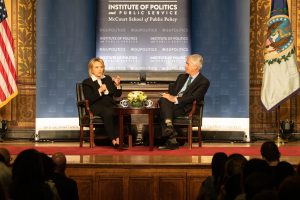Veterans of campaign communications discussed the prevailing narratives of the 2016 campaign and their implications for the 2020 race in a panel on Sept. 2, 62 days before the general election in November. The event, titled “Why (and How) Campaign Narratives Stick,” was sponsored by the Georgetown Institute of Politics and Public Service and McCourt School Massive Data Institute.
The panel featured Alex Connant, communications director of Marco Rubio’s 2016 presidential campaign, Karen Finney, senior advisor of communications and political outreach and senior spokesperson for the Hillary Clinton’s 2016 presidential campaign, Jonathan Ladd, associate professor of public policy and government at Georgetown, and Josh Pasek, assistant professor of communications and media at the University of Michigan. Rebecca Sinderbrand (COL ’99), NBC News’ senior Washington correspondent, moderated the hour-long discussion.
Sinderbrand began the conversation with a question some veterans of the 2016 presidential campaign still struggle to answer four years later: how did now President Donald Trump beat Clinton despite a series of seemingly career-ending scandals besieging his campaign?
When the Access Hollywood tape was leaked to The Washington Post a month before the 2016 election, Sinderbrand recalled thinking Trump’s utterance of “Grab em’ by the pussy,” would be a paradigm-shifting event in the outcome of the race.
“This has upended the whole campaign. Nothing’s going to be the same after this. And then within a few days, it didn’t,” Sinderbrand said.
Sinderbrand now believes the tape had little impact on the outcome of the race because the story played into a pre-existing narrative about Trump.
“It seemed as though the fact it played into the narrative actually led people to discount it,” Sinderbrand said. “The existence of the narrative almost serves to inoculate him.”
In their May 2020 book, “Words That Matter: How the News and Social Media Shaped the 2016 Presidential Campaign,” Ladd and Pasek published the results of their joint study, which asked voters to share their media diet and information they consumed about both Clinton and Trump. Partially based on that study, Ladd credits the backlash Clinton received from using a private email server for official public business during her tenure as secretary of state as ultimately shattering her presidential ambitions.
“One thing we found in 2016 was just how dominant the email story was about Hillary Clinton,” Ladd said. “It was a surprisingly large percentage of what people report hearing about her essentially throughout the whole year.”
Although Finney, (who was unaffiliated with the Clinton campaign at the time the email story broke) acknowledges the harm that came from the campaign’s handling of the story, she believes the real damage came from what the email story said about Clinton.
“It played into a perception about her that people thought was real—that she was secretive,” Finney said.
Unlike with the Clinton campaign, Ladd and Pasek found that no individual story about Trump dominated the minds of voters during the 2016 election.
“There were negative stories that people reported hearing about in our open-ended questions. And these stories would not last long and they would not come back,” Ladd said.
According to Kinney, without one story permanently sticking to the Trump campaign, rival campaigns were unable to form a cohesive narrative around his candidacy.
“We did watch in the primary that nothing seemed to really stick to him,” said Kinney.
Although all four panelists agree Trump has captured the attention of the media unlike other candidates in recent political history, they differ in explaining how he did so.
Pasek and Ladd believe Trump’s campaign was able to survive every scandal because of the bifurcation in the American media environment.
“The people that engage with center media and the people that engage with left-wing media overlap very heavily, whereas the people who engage with more right-leaning media don’t overlap with the other two at all,” said Pasek.
Connant similarly believes conservative media outlets, like Fox News and Breitbart, could be the primary reason for Trump’s ability to thwart a singular campaign narrative.
“Everyone in Iowa that we were trying to reach, is reachable on Breitbart,” said Connant. “If you were an Iowa caucus voter you were hearing twice as much from Donald Trump as what you are hearing from the rest of the field combined.”
Finney meanwhile sees traditional media outlets as culpable actors in fueling the Trump campaign’s rise.
“I remember in the Republican primary where you would see a split screen and maybe Marco Rubio was talking and the other side was waiting—for Donald Trump.”
Finney also asserted the media and Trump, although viewed as enemies, gave each other mutual benefit in the 2016 campaign. With every Trump scandal, the media got more viewers, and Trump got what he desired—voter attention.
Yet, Sinderbrand was doubtful of the power of traditional media outlets to propel a candidate’s rise, citing increasing distrust of mainstream media reporting and organizations.
“The power of the news media to shape narratives has never been lower,” Sinderbrand said.
Looking forward, Pasek believes it will be difficult for Trump to replicate his campaign’s success in 2016 in an election year that has seen the Trump administration struggle to effectively combat the COVID-19 pandemic.
“For Trump, there is an overriding issue this time—and that’s coronavirus,” Pasek said. “This is sticking.”
Connant predicts a Trump loss in November and is increasingly doubtful about the future electoral success of the Republican Party.
“Trump’s Republican Party has gotten its ass kicked in just about every election that was competitive since Election Day 2016,” Connant said. “I’m skeptical that just communicating to your base is a sustainable strategy.”






[…] Source link Write By Author […]
[…] The panel featured Alex Connant, communications director of Marco Rubio’s 2016 presidential campaign, Karen Finney,Source… […]